CRM tools are supposed to make your life easier, but the wrong ones can do the opposite. In fact, 63% of CRM projects fail. The reasons? Too many features. Not enough training. Resistance to change. And most of all? Complexity.
As a small business owner, you don’t need a tool that promises the world. You need one that your team will actually use — one that’s quick to set up, easy to learn, and helps you stay on top of customers, deals, and tasks.
This guide will help you choose a simple CRM that does exactly that.
The core features that CRM software should have
Not all CRMs are built for small businesses. Some try to do everything, and end up slowing your team down. The best ones keep things simple and focused. Here’s what a great CRM should always make easy.
Lead and contact management
Every customer interaction starts with a name, but managing those names shouldn’t feel like a full-time job.
A simple CRM should make it easy to organize your leads and contacts, track every touchpoint, and pick up any conversation without starting from scratch.
Why it matters for small businesses:
You’re getting leads from email, social media, referrals, and events. Without a clear system, things get lost — someone forgets to follow up, or a teammate calls the same client twice. Lead and contact management helps your team stay on the same page – so you can prioritize hot leads, nurture warm ones, and reconnect with cold contacts when the time’s right.
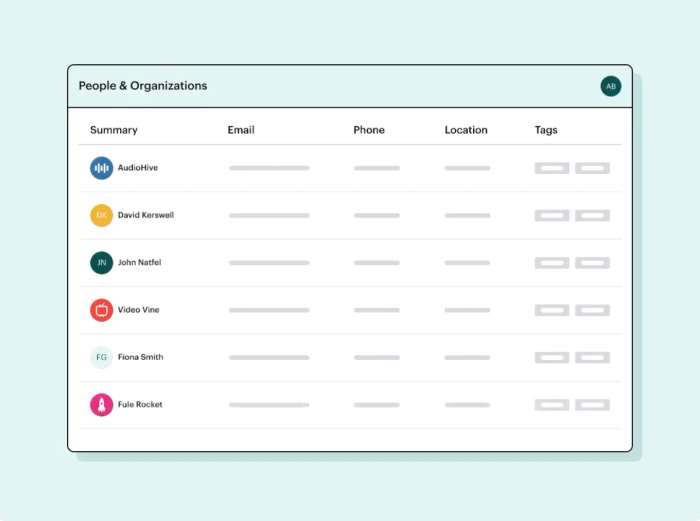
With Capsule, this part is straightforward:
- Contacts and companies are kept separate but linked, so you can manage both together or independently
- You can view a full timeline of emails, notes, tasks, and files in one place
- Custom fields let you track whatever matters to you (like budget, referral source, or project type)
- Filtering and search tools make finding the right contact easy, even with thousands of names
Pipeline and deal tracking
Knowing who your leads are is one thing. But knowing where each deal stands — and what needs to happen next — is what helps you close more of them.
Pipeline and deal tracking keeps your sales flow visible, so you can focus on high-priority deals and spot bottlenecks early.
Why it matters for small businesses:
When you’ve only got a few reps and a dozen deals on the go, you can’t afford chaos. A clear pipeline gives your team structure — it shows what’s progressing, what’s stalling, and where to focus today.
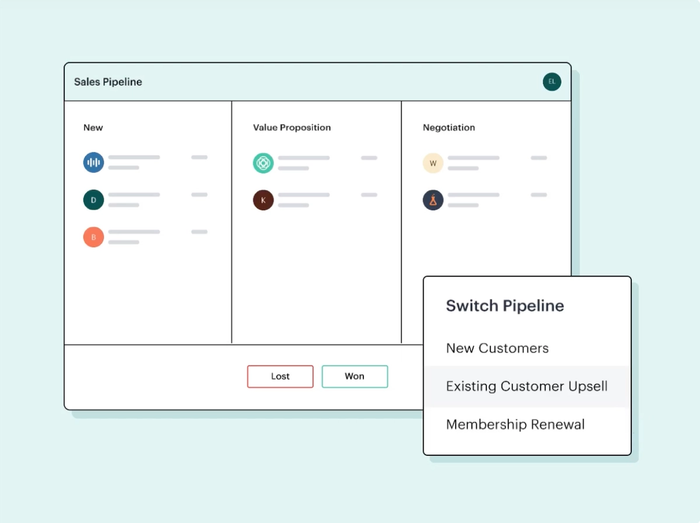
How Capsule makes this simple:
- A drag-and-drop pipeline keeps everything moving — no spreadsheets or back-and-forth emails needed
- Deal cards show everything in context: contact info, notes, related tasks, and deal value
- Filter by rep, stage, or closing date to help you coach your team and plan resources
It’s the difference between reacting to deals and actually managing them.
Task and activity tracking
A simple task list won’t scale your sales process — but a repeatable one will!
For many small teams, important follow-ups, onboarding steps, or renewal reminders depend on memory or a confusing and complex spreadsheet. It works… well, until it doesn’t. Someone’s on vacation, a deal slips, or a client doesn't hear back for two weeks.
Why it matters for small businesses:
Your marketing assistant works two days a week. With assigned tasks and due dates linked to specific contacts, they don’t need to ask “What should I do today?” Every priority is waiting for them in the CRM, no need for lengthy onboarding or daily check-ins.
Imagine a sales rep leaves for vacation mid-negotiation. Without a task log, their teammate has to dig through emails and Slack threads to get up to speed. With a shared activity timeline and assigned tasks, they can jump in without any problems — onboarding steps, scheduled callbacks, or key approvals are right where the team needs them.
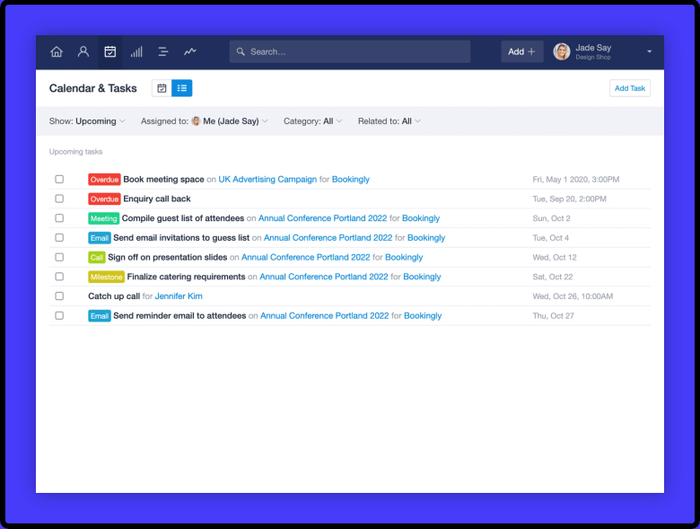
How Capsule helps:
- Create tasks for anything — from follow-up calls to proposal reviews — and assign them to contacts or deals.
- View tasks as a checklist or in a calendar layout, depending on how your team works best.
- Use Capsule Tracks to build repeatable workflows, like onboarding a new client or chasing overdue invoices.
While your pipeline manages deals, task tracking keeps your internal processes (like follow-ups or renewals) on track.
Email integrations
Your inbox is where relationships often start, but valuable conversations can quickly get stuck in individual email threads. The right CRM solves this, but only if it connects to your inbox without adding extra steps.
Why it matters for small businesses:
Your customer service lead sends troubleshooting advice but forgets to log it. When the client calls back, the support team scrambles to understand what’s been promised. With synced emails in the CRM, no one has to piece things together.
Capsule makes your inbox an extension of your CRM:
- Connect Gmail or Outlook directly, so emails sync seamlessly with contact timelines.
- Auto-log full threads – tag one message, and all replies follow.
- View contact history alongside your inbox, so every reply is informed.
Reporting and analytics
You don’t need a team of analysts to know where your sales stand. But you do need clear answers – fast. Reporting turns raw CRM data into insights you can actually use, like which deals are likely to close or what opportunities you lost.
Why it matters for small businesses:
Planning your next hire, budgeting for a new campaign, or just figuring out why last month’s sales dipped – all of it hinges on knowing your numbers. Without real data, you depend on guesswork.
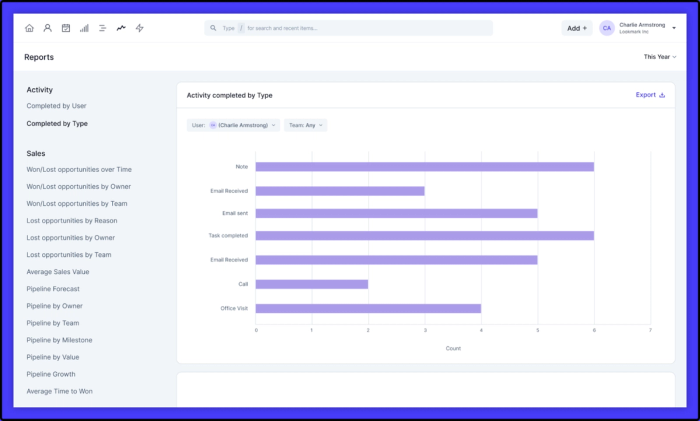
Capsule turns your data into decisions:
- The Sales Dashboard provides a clear view of deal stages and win rates.
- Activity reports track calls, emails, and meetings.
- Forecasts help you estimate revenue, using deal values and probabilities.
And when you need deeper analysis, connect to Looker Studio or export for easy sharing. Capsule makes reporting simple enough for everyday use but sharp enough to guide big decisions.
Mobile access
For small business owners, work doesn’t stop at the desk. If your CRM can’t move with you, key updates slip through unnoticed.
Why it matters for small businesses:
A sales call on the road. A chance meeting at an event. A quick follow-up between meetings. Without mobile CRM access, these moments stay in your head – or worse, get lost entirely.
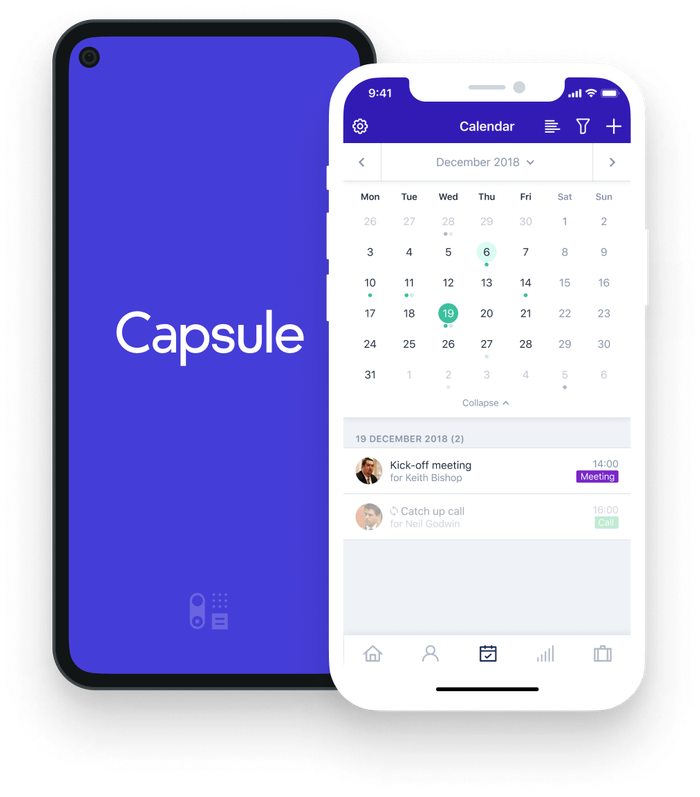
Capsule’s mobile app keeps your CRM in your pocket:
- View and update contacts, deals, and tasks in real-time, right from your phone.
- After a call, log notes while the details are fresh and avoid missing any important bits of info.
- Even offline (in a plane or patchy service area), you can work confidently and stay up to date. Capsule syncs everything when you’re back online.
- On iPhones, Capsule syncs contacts for caller ID so you know who’s calling before you answer.
User roles and permissions
When your business grows, so does your team. But not everyone needs to see everything in your CRM. Setting the right roles and permissions helps keep sensitive info as private as you want it to be.
Why it matters for small businesses:
Maybe you’ve hired a freelancer to handle lead generation. Or a part-time assistant manages follow-ups. They don’t need access to financial details or VIP clients – just the contacts and tasks relevant to them. Cleaner access keeps things simple and reduces room for error.
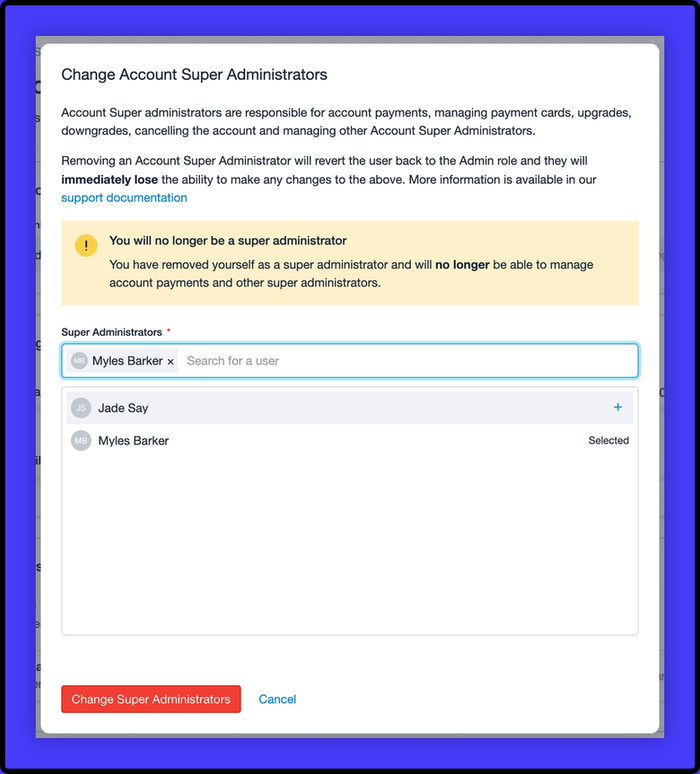
How Capsule helps:
- Predefined roles (Administrator, Standard User, Restricted User) make setup easy.
- Admins get full control; standard users stick to their own records.
- On higher plans, you can lock down access to specific deals, contacts, or cases – ideal for confidential projects or financial data.
- Assign tasks or let managers view team-wide reports, while limiting who can export or delete data.
Your team gets what they need, nothing more.
Integrations with key tools in your tech stack
Your CRM shouldn’t be another isolated app – it should work alongside the tools you already use. Integrations save you from jumping between platforms, copying data manually, or losing track of where things are.
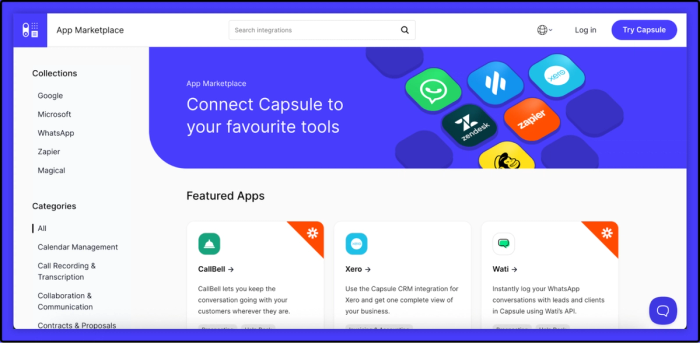
Why it matters for small businesses:
As a small business owner, you may be juggling various tools: accounting software, email campaigns, calendars, and maybe even e-commerce platforms. Without integration, you risk duplicating work (or worse, missing something important). A connected system keeps everything in check, so you spend less time managing data and more time growing your business.
How Capsule helps:
- Sync with QuickBooks or Xero to view invoices and payment statuses alongside your customer records.
- Connect with Mailchimp to pull in campaign results, like open rates or clicks, straight into the CRM.
- Tie into Google Workspace or Microsoft 365 – keeping your communication and scheduling in sync.
And if you’ve got niche tools? Capsule works with Zapier, giving you access to over 5,000+ apps.
Capsule becomes the hub for your customer data – all without forcing you to ditch the tools you already know and trust.
Custom fields and tags
No two businesses track the exact same details. One might need to log account numbers, another tracks contract renewal dates, and another wants to flag VIP clients. That’s where custom fields and tags come in – they help you mold the CRM around your business.
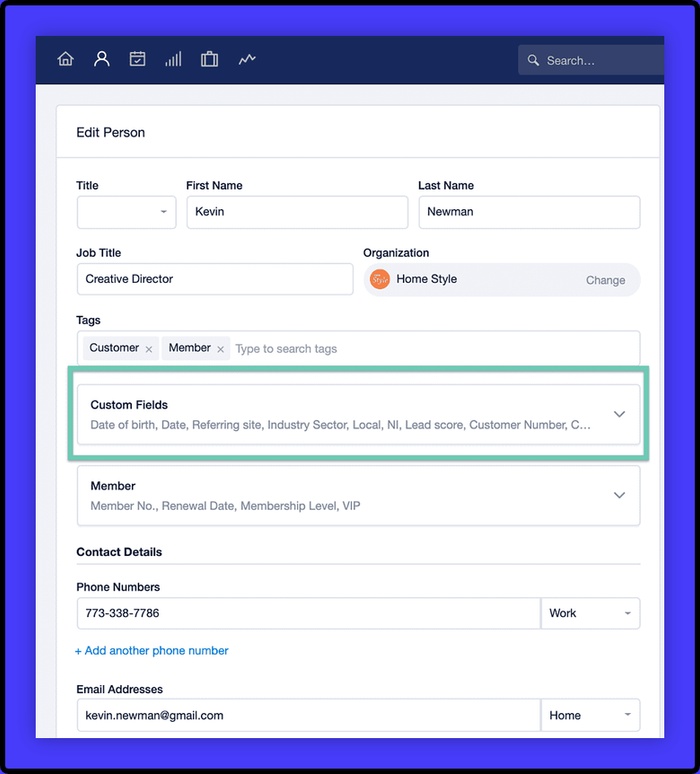
Why it matters for small businesses:
Most CRMs offer a one-size-fits-all structure. But your business? It’s got quirks. Custom fields let you track exactly what matters, whether that’s contract end dates, customer preferences, or the salesperson responsible. You stop bending to someone else’s setup. For example, if you need to see which clients need contract renewals this month, a custom date field makes that easy to filter.
How Capsule helps:
- Track key details like contract dates, lead sources, or customer tiers—whatever matters to your business.
- Label contacts with categories like “VIP,” “Referral,” or “Trade Show 2024” for quick filtering and segmentation.
- Pull up targeted lists or build reports based on any field or tag.
Activity history and notes
Contacts and leads are just names on a list – until you add the story behind them. That’s what activity history does: it captures every call, email, meeting, and note in one place. So even if a conversation started last quarter or with someone else on your team, you always know what’s been said and what’s next.
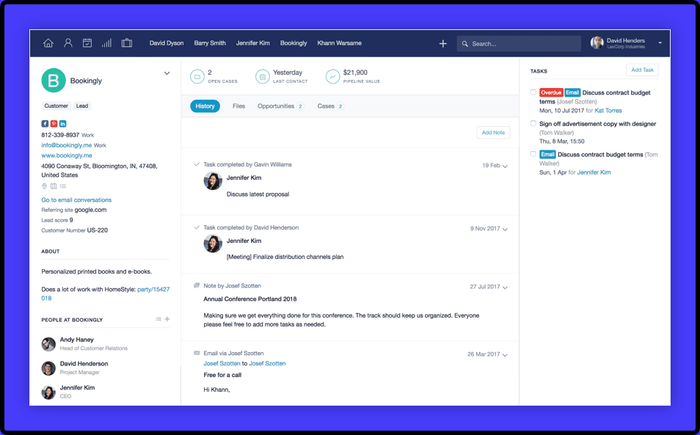
Why it matters for small businesses:
When you manage a growing list of clients, it’s impossible to remember every detail. Did they mention needing a quote in March? Were they waiting on a product update? Without that history, you risk treating long-term clients like strangers – or missing key chances to deepen relationships.
How Capsule helps:
- Every touchpoint gets logged on the contact's timeline.
- The timeline works across people, companies, and deals, so you see the whole picture no matter where you look.
- Search for past notes or pull up email threads to quickly get back up to speed.
Even if someone is out sick or leaves the company, nothing gets lost with Capsule.
Before you choose – a quick CRM checklist
Not every CRM will fit your business, and that’s a good thing. Here’s what to keep in mind before you decide:
- Is it easy to use? If it takes weeks of training or feels like too much system, your team won’t touch it.
- Does it have the essentials? Lead management, deal tracking, tasks, email syncing, and reporting — the basics should feel intuitive.
- Would it adapt without overwhelming you? Too much customization can weigh teams down – balance flexibility with simplicity.
- Does it work wherever you do? Mobile access is key when your desk is anywhere.
- Can you try it without the hassle? A free trial lets you explore without commitment.
Capsule CRM keeps things simple
Your business doesn’t need another tool that slows you down. Capsule gives you the essentials to manage relationships, track deals, and stay on top of tasks — without the extra fluff.
Easy to use, quick to set up, and flexible enough to fit your workflow.
👉 Start your free trial today and see how simple CRM can be.




